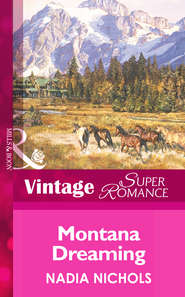По всем вопросам обращайтесь на: info@litportal.ru
(©) 2003-2024.
✖
Buffalo Summer
Автор
Год написания книги
2018
Настройки чтения
Размер шрифта
Высота строк
Поля
“Steven Young Bear’s sister,” Pony said.
McCutcheon’s blue gaze intensified. “That’s why you look so familiar. I’ll be damned! Why didn’t Steven tell me you were coming?”
“I asked him not to. I’ll wait here while you call Pete.”
McCutcheon shook his head with a faint grin. “I don’t need to call anybody. If you’re Steven’s sister, that’s good enough for me.”
Pony’s heart leaped. “Does that mean you will consider me for the job?”
“That means you’re hired, you and your five boys. There’s plenty of room for all of you here in the main house. When can you start?”
“In three weeks.”
“That long?” His face fell.
“I’m a teacher and school lets out in three weeks.” Pony held her breath, her heart hammering. Please, oh please…
McCutcheon nodded reluctantly. “All right. We’ve survived this long. I guess we can wait until mid-June. The job pays three-fifty a week, plus room and board.”
She could hardly have hoped for as much, and struggled to maintain a neutral expression. “I can only work the summer.”
“I’m hoping you can teach me and my ranch manager all we need to know in that time.”
“I am sure that I can.”
“Good. Then I guess I’ll see you in three weeks.” He put out his hand and took hers in a warm, firm handshake; a single up-and-down motion that made her fingers tingle curiously. She turned to descend the porch steps and was almost at her truck when his voice stopped her. “Ah…miss?” She turned and glanced up at him questioningly. “What’s your name?”
“Oo-je-en-a-he-ha,” she said. She stood for a few moments, watching him mentally grapple with the impossibility of it, and then, with a barely suppressed smile, she said, “But you can call me Pony, if you’d rather.”
CHAPTER TWO
“SHE HAS FIVE BOYS,” McCutcheon said, pulling the mug of coffee that Bernie Portis had just topped off closer to him and studying the whorls of steam rising from the strong black brew. It was midmorning of the following day and the Longhorn Cafe, the only eating establishment in Katy Junction, was enjoying a brief lull between breakfast and lunch.
“Five?” Bernie paused, coffeepot in hand. Her friendly face split into a smile. “She’s been a busy gal. How old is she?”
“Not old enough. At least, she didn’t look like the mother of five kids.” Too young and too beautiful, he thought.
“How old?”
McCutcheon lifted his shoulders. “Hard to say. Late twenties. Early thirties, maybe.”
“Okay, so she started young. Say, eighteen years old. First baby. Second baby at twenty. Third at twenty-two. But how much work are you expecting to get out of a bunch of little kids? And who’s going to wipe their noses and change their diapers while their mother is out herding buffalo? Ramalda?” Bernie gave him a teasing smile before making a run through the tiny restaurant, refilling customers’ coffee cups and pausing to chat briefly here and there. She was Guthrie Sloane’s big sister, and a sweeter, more generous soul did not exist west of the Rockies nor east of them, either.
McCutcheon took a sip of his coffee and frowned. He hadn’t thought to ask Pony how old her children were. He had a sudden vision of a three-year-old boy in the saddle, reins in his teeth, horse running flat out, twirling a lariat better than a washed-up baseball player by the name of Caleb McCutcheon could. It wasn’t Caleb’s fault that Badger and Charlie hadn’t taught him how to throw a rope yet. They kept promising, and then one day slid into the next, one week followed another, and he was no closer to being a cowboy than he’d been the day he’d bought the ranch.
Ramalda had already threatened to quit. “Indians!” she had muttered when he told her, as if the word itself were a bitter poison in her mouth. Her venom had surprised Caleb, but not Badger, who’d been sharing the table the way he and Charlie almost always did nowadays, at suppertime. Or any other time for that matter. The two old cowboys had sort of come with the ranch. “Now, Ramalda,” Badger said, smoothing his white mustache. “When I first laid eyes on you, I thought to myself, that there’s an Apache woman, sure as shootin’. How do you know you ain’t part Injun yourself? And what gave you such a sour take on things, anyhow? I thought you liked little ’uns.”
Ramalda had turned her broad back to them with a string of heated Spanish that neither he nor Badger could make heads or tails of, banging pots and pans about and letting her feelings be known in no uncertain terms. “Six Indians here?” she exploded, brandishing a frying pan in one fat fist. “I queeet!”
“Whoa!” Caleb said, alarmed at the thought of losing such a phenomenal cook and housekeeper. “They’re Steven Young Bear’s nephews. They’re his sister’s children. You like Steven.”
Ramalda turned and slammed the frying pan down on the woodstove, cut a big chunk of lean salt pork into it and turned again, wielding the knife as if she intended to use it on Caleb. “Six Indians here, I queeet,” she repeated emphatically.
“Well, it’s too late. I’ve already hired them,” Caleb said. “But I’d sure hate to lose you, Ramalda. I can’t imagine coming into this kitchen and not having you cussing me out in Spanish or feeding me those delicious meals. Look at me. I’m getting fat.” He glanced down and felt a twinge of alarm at the truth of his words. “I guess maybe it would be better for my waist if you left, but I’d sure hate it. I hope you stay. You’re important to this place. We need you here, and Jessie’s coming home soon. It would be awful if you weren’t here for her wedding to Guthrie.”
Jessie. That name had been enough to melt Ramalda’s stern visage. She turned back to the stove to stir the sizzling pork with the point of her knife and never said another word about quitting. Maybe she remembered that Jessie was part Indian, too; that Jessie’s father had been a half-breed, and that the history of the Bow and Arrow had been linked with Native Americans since the very beginning.
Or maybe she’d really quit when Pony and her five boys came in three weeks. “You’re looking mighty pensive,” Bernie said, sliding a piece of apple pie in front of him. “Thinking about what having five kids stampeding around the place will be like?”
Caleb picked up his fork and grinned. “I’m thinking about all the work we’ll get done this summer,” he said, feeling another twinge at this half-truth and recalling Badger’s troubling prophecy. “One good boy can do the work of half a man,” the old cowboy had said when Caleb told him about the new hires. “But two boys? Put two boys together and they’re worthless. Five, you say? Hell, boss, I don’t even want to think about it.”
Five boys. Caleb forked a piece of apple pie into his mouth and savored the blend of tart apples and spices and tender crust. Five boys…and one very intimidating young woman, Oo-je-ne… He shook his head and gave up. Pony. Strange name, but a whole lot easier to say. Put all of them together with a herd of buffalo rampaging across the ranch… Caleb laid his fork down and pushed the plate away, overwhelmed with a sudden surge of anxiety.
In three weeks the summer would begin, and quite suddenly he was dreading it.
PONY WASN’T SURE how the boys would take the news that she had hired out their services for the summer. She was especially leery of Roon, the latest of the five to have taken refuge in her little shack on the edge of the Big Horn foothills. Roon was an introvert with so much anger and confusion bottled up that Pony sometimes feared he would explode. She had taught him in her third-grade class. He had been like the others then, a normal nine-year-old on the brink of discovering the universe. Now he was thirteen and the world was his enemy. Four years had passed. What had happened? She had not pried. When he’d shown up one cold snowy night on her doorstep, she’d stood aside and let him in. He had been there since December, a quiet brooding presence who listened to the lessons she gave the others but did not participate.
One of the rules of her household was that any child she took in had to learn the lessons she taught and eventually take the GED. It was a fair trade. Since she had been living on the reservation in the capacity of teacher and unofficial foster parent, she had launched four young people into far more promising futures than they might have had the opportunity to explore otherwise. Two of them had gone on to college, a major triumph for her. The other two had taken mining jobs off the reservation, and she still had contact with all of them on a regular basis.
So what of Roon? How would she ever reach him, turn him around, make him obey the rules she laid down? She had threatened repeatedly to throw him out, but in the end she never did. Where would he go? His own parents had left the reservation. They had leased their land allotment to a white farmer and gone to Canada, to live on a Cree reservation where the wife had blood relatives. They had taken the younger children with them. Roon had stayed with Pony, and she did not have the heart to displace him.
But would he work willingly for Caleb McCutcheon? That, and so much more, remained to be seen. She would tell the boys about the job, and if they didn’t want to go to the ranch, they could return to their own families for the summer. That was fair.
But the boys were not at Nana’s place. “They took your uncle’s old truck,” Nana said, sitting in her rocker and smoking one of her acrid-smelling hand-rolled cigarettes. “Went back home.”
“But none of them can drive. None of them even have licenses!”
Nana shook her head, her deeply wrinkled face impassive. “They went home.”
Pony drove the five miles to her little house much too fast, but the tribal police were not on patrol. She spied no wrecked vehicles along the way, and was relieved to see Ernie’s truck parked safely in her yard. She ran up the steps and burst into the kitchen. The boys, four of them, were crowded around the table, eating peanut butter sandwiches and drinking cans of soda.
“Where’s Roon?” she said.
“In the back room,” Jimmy replied, mouth full of sandwich. “Nana gave him a book to read.”
“Who took Ernie’s truck? Who drove here?”
“Dan did,” Jimmy said. “Nana said we had to leave.”
Pony looked at Dan. “Why?”
Dan’s dark eyes dropped and he lifted his shoulders. Pony looked at Joe. “Why did she tell you to leave?”
“We took her tobacco,” he said. “We told her we’d replace it.”
“Yes, you will,” Pony said grimly. “Right now. Let’s go.”
“We already smoked what we took,” Martin said, staring at her ruefully through his thick glasses. “It’s gone. But we’ll get her more. Don’t worry.”











